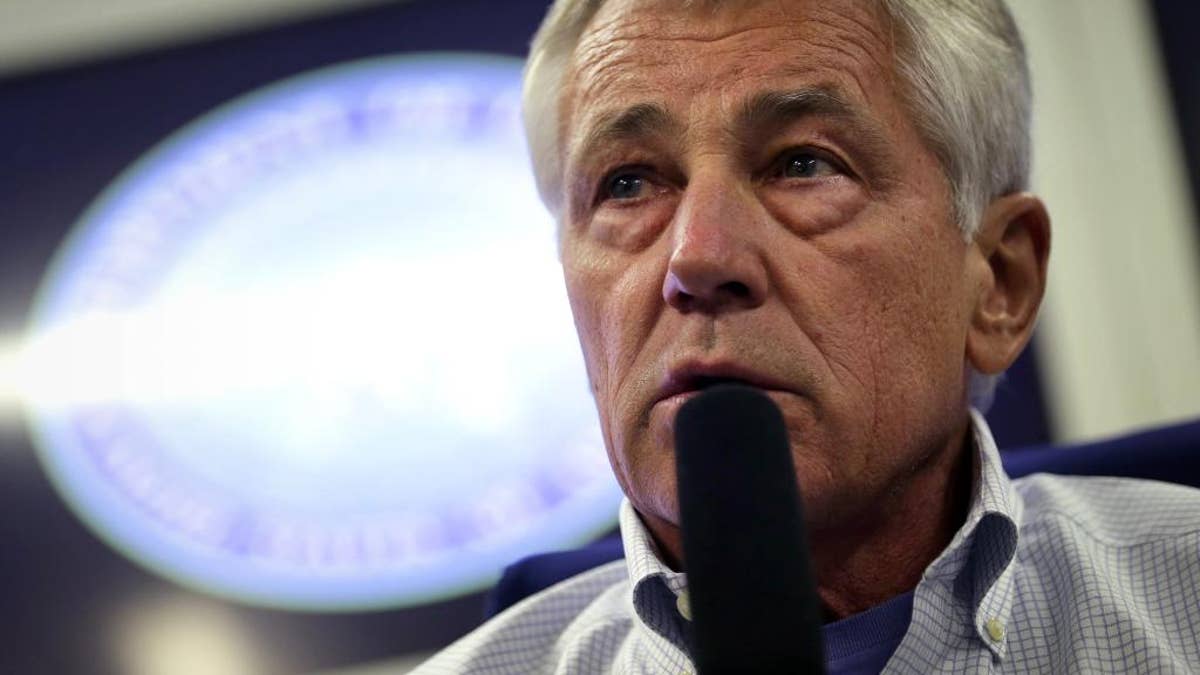
U.S. Defense Secretary Chuck Hagel speaks to members of a travel press pool, Friday, April 4, 2014, in flight, while en route to Tokyo, from Honolulu. Hagel is traveling to Japan, China and Mongolia. (AP Photo/Alex Wong, Pool) (The Associated Press)
Former Defense Secretary Chuck Hagel revealed in an extensive interview published Friday that he had approved plans to strike Damascus with Tomahawk cruise missiles after Syria’s Bashar al-Assad crossed the “red line” by using chemical weapons – but President Obama told him to stand down.
The interview with Foreign Policy comes nearly a year after his acrimonious exit from the Obama administration. Still smarting from the circumstances of his departure, Hagel told Foreign Policy that the White House tried to “destroy” him even after he resigned.
The interview explored the tensions between Hagel and others on Obama’s team, but offered particularly revealing details about the backstory to the president’s decision backing off his “red line” with Assad.
The former Pentagon chief said that decision in 2013 dealt a big blow to U.S. credibility.
“Whether it was the right decision or not, history will determine that,” Hagel told Foreign Policy. “There’s no question in my mind that it hurt the credibility of the president’s word when this occurred.”
While it is well-known that Obama chose not to go forward with any military action against Assad in 2013 despite drawing that line – and instead pursued a diplomatic path to have Assad hand over his chemical weapons stockpile – Hagel described the military option as robust up until the moment Obama nixed it.
According to the article, on Aug. 30 of that year, Hagel spent the day giving the OK to plans for a “barrage” of missile strikes on Syria’s capital. Naval destroyers also reportedly were awaiting orders to strike.
But then, while Hagel was at dinner with his wife in northern Virginia, the White House called to connect him with Obama.
The president, according to the piece, told Hagel to stand down and that the U.S. would not take military action.
“A president’s word is a big thing, and when the president says things, that’s a big deal,” Hagel said in the interview.
A senior administration official defended the decision to Foreign Policy, saying Obama was not prepared to take military action without consulting Congress first – and the diplomatic deal that had Assad relinquish his weapons resulted in a Syria “free of its chemical weapons program.”
In the interview, Hagel also complained about the allegedly extensive and meandering deliberations over Syria policy, including hours-long meetings that “were not productive.” He agreed with the reluctance to dispatch a large ground force to the region, but voiced frustration over the confusion about how far the U.S. would go to back rebels in Syria.
Meanwhile, Hagel fumed over how “certain people” were “vilifying me in a gutless, off-the-record kind of way” as he left the administration.
This was a reference to White House officials criticizing him anonymously to news outlets, including saying he didn’t speak up at key meetings.
“They already had my resignation, so what was the point of just continuing to try to destroy me?” he told Foreign Policy.








































